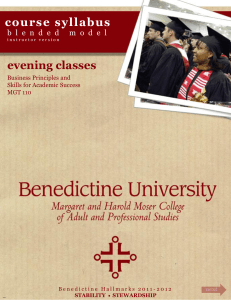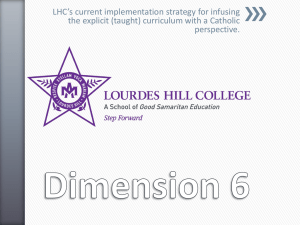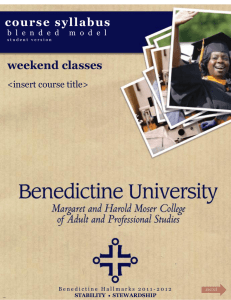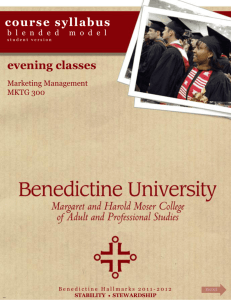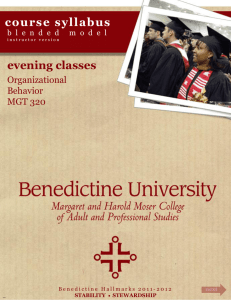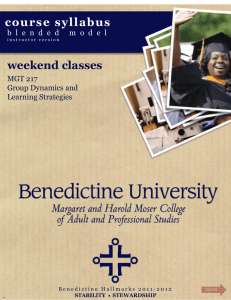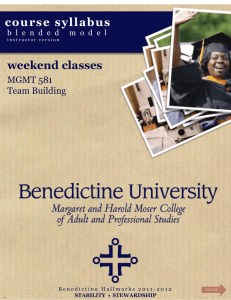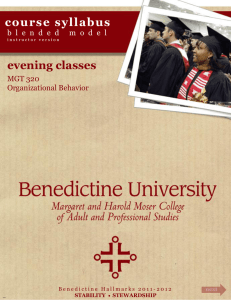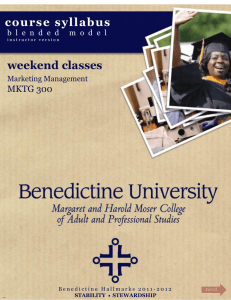Learning Objectives - MoserCollegeHypermediaSyllabi
advertisement
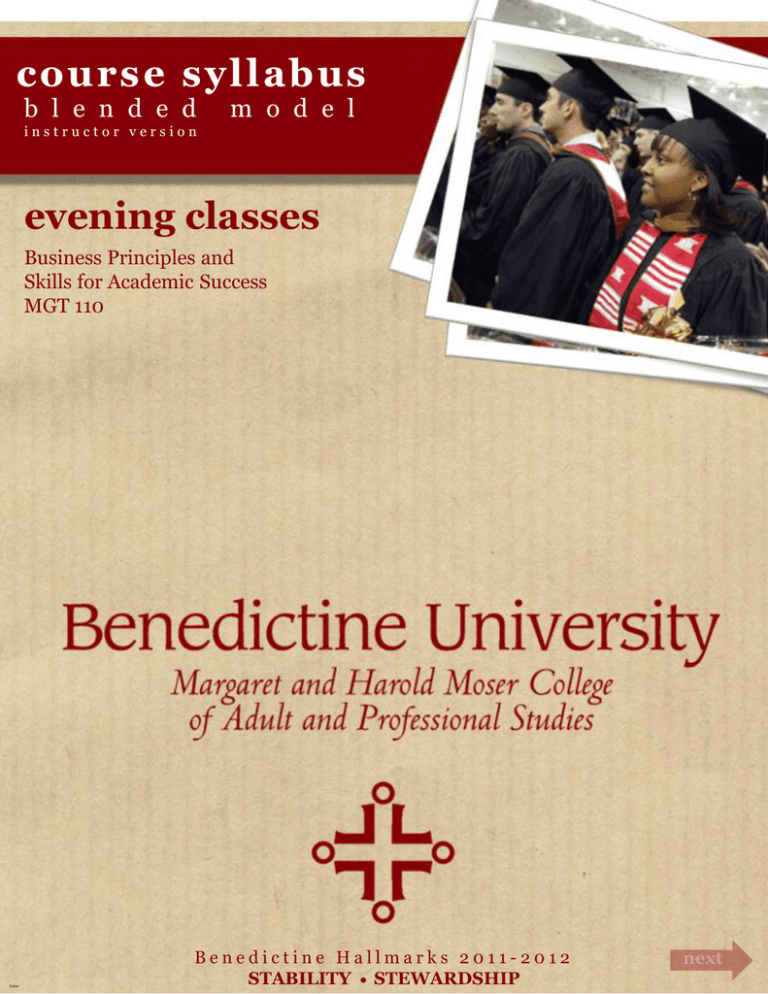
course syllabus b l e n d e d m o d e l instructor version evening classes Business Principles and Skills for Academic Success MGT 110 home Cover about expectations resources course overview learning outcomes Benedictine Hallmarks 2011-2012 STABILITY STEWARDSHIP IDEA schedule & sessions next course syllabus Addresses the educational needs of adult students by developing and providing engaging, relevant and accelerated programs. blended model MGT 110 Enhances scholarship, leadership skills, social responsibility, and promotes life-long learning. Provides high-quality, easily accessible educational opportunities for adult learners. Enables adults to earn specific undergraduate and graduate degrees while maintaining their personal and professional commitments. Business Principles and Skills for Academic Success instructor version Develops new degree and non-degree programs that address the expressed needs of the professional community. content links index about this document about Moser College about blended learning hallmarks of a Benedictine education student expectations attendance policy financial aid submission of work library resources services for students with disabilities Academic Honesty Policy APA formatting and style netiquette course overview required textbooks grading scale IDEA objectives IDEA description learning outcomes course schedule Moser College Mission Statement: Moser College embodies the values of respect, excellence, collaboration, and professionalism. We are committed to delivering innovative and dynamic programs designed for adult students who are dedicated to enhancing their professional, local, and global communities. Moser College Vision Statement: To be one of the premier university colleges in the nation. Love of Christ and Neighbor Prayer Stability Conversatio Obedience Discipline Humility Stewardship Hospitality Community Benedictine University home about expectations Margaret and Harold Moser Center 1832 Centre Point Circle Naperville, IL 60563 resources course overview learning outcomes Phone: (630)schedule 829-6289& IDEA sessions Fax: (630) 829-1375 http://www1.ben.edu/programs/a dult_cohorts/mission_vision.asp 2 Content Links Business Principles and Skills for Academic Success | MGT 110 About Your Program at Benedictine University – Moser College About This Document This is a hypermedia document – it has been built to mimic navigation on the web. This document can also be viewed as a presentation or it can be printed like a traditional document. We use this sort of document because it allows for navigation links (hyperlinks) to text, graphics, audio/video, and the web. This type of document also allows you to navigate in a nontraditional, nonlinear way – by following the page links you are not bound to read or flip through the document in any sort of order. This is yet another example of Moser College’s commitment to advancements in technology and blended learning. About Moser College The Moser College of Adult & Professional Studies delivers its curricular programs in a specifically designed structure deliberately oriented for working, adult learners. The Moser College is committed to providing a learning environment which extends beyond the classroom and is designed specifically to meet the needs of its students and their employers by bringing a quality educational experience without requiring the student to relocate or travel extensively beyond their home area. Benedictine University's Moser College of Adult & Professional Studies is fully accredited by the Higher Learning Commission of the North Central Association of Colleges and Schools*. * http://www.ben.edu/academic_programs/moser/about/index.cfm About Blended Learning Blended learning is the integration of different learning environments: mainly the online format with the face-to-face format, but may also include mobile learning. Blended learning, also referred to as hybrid learning, relies on both the advantages of digital/technology innovation and the methods of face-to-face instruction. At Moser College, we use blended learning by combining asynchronous online classroom sessions with a face-to-face classroom environment. We alternate between the online session and the face-to-face session in 5-week courses, with the A session being face-to-face and the B session being online. hallmarks of a Benedictine Education: home about expectations resources course overview learning outcomes IDEA schedule & sessions Love of Christ and Neighbor Prayer Stability Conversatio Obedience Discipline Humility Stewardship Hospitality Community 3 About Business Principles and Skills for Academic Success | MGT 110 The Ten Hallmarks of a Benedictine Education A Benedictine Education Based on the Rules of Saint Benedict, a Benedictine Education is based on the Benedictine Wisdom Tradition that sets as its goals the transformation of the Human mind AND Heart and has at its foundation “The Ten Hallmarks of a Benedictine Education”. The Ten Hallmarks Each academic year Moser College will be celebrating two of the Hallmarks. This academic year 2011-2012, the Hallmarks Stability and Stewardship have been chosen. The ten hallmarks are: 1. Love of Christ and Neighbor 2. Prayer: a Life marked by liturgy, lection and Mindfulness 3. Stability: commitment to the daily life of this place, its heritage and tradition 4. Conversatio: the way of formation and transformation 5. Obedience: a commitment to listening and consequent action 6. Discipline: a way toward learning and freedom 7. Humility: knowledge of self in relation to God, others and creation 8. Stewardship: responsible use of creation, culture and the arts 9. Hospitality: openness to others 10. Community: call to serve the common good home about expectations resources Portrait (1926) by Herman Nieg (1849–1928); Heiligenkreuz Abbey, Austria course overview learning outcomes IDEA schedule & sessions Love of Christ and Neighbor Prayer Stability Conversatio Obedience Discipline Humility Stewardship Hospitality Community 4 Hallmarks Business Principles and Skills for Academic Success | MGT 110 Student Expectations Expectations of Students In order to get the maximum use of the time available, it is expected that you will: • Read the material to be covered in the class and complete required assignments prior to attending the class/session; • Arrive/login to class/session prepared to participate actively; • Be prepared to actively participate in the collaborative activities of each class/session; and • Always feel free to seek additional help from the instructor when the need arises. Attendance Policy Students may not miss more than 25% of the live classroom sessions. Doing so will result in an F for the course. financial aid information Submission of Work All assignments are to be submitted into Desire 2 Learn (D2L) unless otherwise noted by instructor. Assignments must be submitted by due date. Any assigned work submitted late for any unexcused reason will receive a lowered grade. Please refer to your instructor’s late work policy located in D2L. In the event that you miss an examination for due cause, arrangements must be made with the instructor for a make-up examination. Important criteria concerning the submission of work: • Make-up examinations may differ from the original class examination. • Per University policy, assignments cannot be accepted by an instructor after the last day of the course. • Only discussions threads posted by 11:59 pm CST on the due date will count for grading purposes. information concerning netiquette: home about expectations resources course overview learning outcomes IDEA schedule & sessions Love of Christ and Neighbor Prayer Stability Conversatio Obedience Discipline Humility Stewardship Hospitality Community 5 Expectations Business Principles and Skills for Academic Success | MGT 110 Financial Aid Information Applying for Financial Aid A college education is one of the largest financial investments a family will make. We believe that an education from Benedictine University will provide valuable returns throughout a student's lifetime. The Office of Financial Aid is dedicated to helping students and their families make a Benedictine University education affordable. We view the process of financing an education as a partnership. Although the student and his/her family have primary responsibility for meeting college costs, Benedictine University, as well as the federal and state governments have a variety of financial aid programs available to students who need financial assistance. Types of Financial Aid Benedictine University's Office of Financial Aid administers a variety of federal, state and institutional programs of student financial assistance. All financial aid recipients must maintain satisfactory academic progress in accordance with the published, "Satisfactory Academic Progress Policy for Financial Aid Recipients.“ • After completing the financial aid application process, the student will receive a financial aid award notification letter. The award letter will include the program(s) that the student is eligible to receive and the award amount(s). • Grants/Scholarships - Grants and scholarships are considered to be gift assistance. This means the awards do not have to be repaid. • Loans - Loans are considered to be a form of self-help assistance. Loan programs provide funds for educational purposes and are paid back with interest. • Employment - Part-time jobs on campus are available to students through the University and Federal Work-Study program. Students working on campus receive a bi-weekly paycheck. • Applying for Financial Aid – All students applying for financial aid are asked to complete the Free Application for Federal Student Aid (FAFSA). FAFSA – Free Application for Federal Student Aid The FAFSA is required for all federal, state (Illinois residents) and Benedictine University need-based assistance. It should be completed as soon as possible after January 1st. Applying online with FAFSA on the Web at www.fafsa.gov is faster and easier than using a paper FAFSA. Have your completed U.S. Federal Income Tax returns readily available when completing the FAFSA. Include Benedictine University's school code: 001767 so the results of your FAFSA application will automatically be sent to our financial aid office. Sign you FAFSA with a Federal Student Aid PIN. Apply for a PIN at www.pin.ed.gov. If you are providing parent information, one parent must also sign you FAFSA. home about expectations resources course overview learning outcomes IDEA schedule & sessions Love of Christ and Neighbor Prayer Stability Conversatio Obedience Discipline Humility Stewardship Hospitality Community 6 Financial Aid Business Principles and Skills for Academic Success | MGT 110 About Netiquette What is Netiquette? "Netiquette" stands for "Internet Etiquette", and refers to the set of practices which help to make the online experiences pleasant for all involved. As you might expect, netiquette, like other forms of etiquette, is about courtesy, manners, codes of behavior, protocols and respect. Netiquette primarily focuses on how we interact with one another online, by being aware of: our use of language, others’ cultural background, conventional norms, and other behaviors. Below you will find guidelines concerning the basics of online interaction. If it isn’t something you would say or do in the face-to-face classroom, it is probably inappropriate in the online class as well. Netiquette Basics 1. Follow the Golden Rule (“One should treat others as one would like others to treat oneself”) 2. Be ethical, fair, tolerant and mindful of others – avoid stereotyping, judgment and prejudice 3. Know the boundaries of particular cyberspaces – what is acceptable in a text or chatroom with friends may not be appropriate in a classroom or in an online conversation with an instructor 4. Respect the time of others by: 1) using descriptive subject lines, 2) resizing images for the web, 3) providing links instead of copying and pasting content, 5) using white space by inserting blank lines between paragraphs and headers and 6) limiting your use of attachments 5. Copy the minimum number of people – it is tempting to send “email” or “message blasts” because it is easier for the poster, but it is not easier for the reader Inappropriate Online Usage 1. Avoid “flaming” – flaming is sending offensive, insulting or criticizing messages. This happens more often online then in face-to-face interaction, because there is an illusion of anonymity. 2. Flaming is neither productive nor appropriate for the learning environment 3. Always avoid flaming when it comes to content and opinions, but also avoid it when it comes to grammar, punctuation and spelling corrections 4. Avoid using CAPS if possible and never type messages in ALL CAPS – this is considered yelling and is often seen as a form of aggression 5. Use emoticons ( :) , :( , :-) ) sparingly and avoid the use of JK, BRB, LOL and other text language Confidentiality and Privacy 1. 2. 3. 4. Email, messaging and posting are forms of written record and are just as permanent as a letter or document Do not publicize your own or others’ personal information (such as email, phone numbers, last names etc.) Respect copyright and cite any and all sources Do not expect that your communications are private, instead assume all communications are public For more information please review Netiquette by Virginia Shea home about expectations resources course overview learning outcomes IDEA schedule & sessions Love of Christ and Neighbor Prayer Stability Conversatio Obedience Discipline Humility Stewardship Hospitality Community 7 Netiquette Business Principles and Skills for Academic Success | MGT 110 Resources for Success Benedictine’s Library Resources Benedictine University Libraries strive to provide the resources for all of your academic and research needs. Providing access to over 120 databases, 200,000 books and eBooks, and helpful librarians 7 days a week, we are here to assist you in person and online. The primary mission of the Benedictine University Library is to provide library resources and services that support the Benedictine University community and meet its academic and research needs. To support our mission, the Library has made provisions for all students to gain access to important academic resources through the Benedictine Library Website. As you begin your academic journey please take note of these key concepts that will affect that access: • Entry into academic databases and most Library resources must be made through the Benedictine Library Website at www.ben.edu/library • Within one week of your official enrollment your patron information will be automatically entered into the library system, where once entered, you will be able to check out books and access databases • When off-campus you will be prompted by authentication software (a proxy server) to provide your Library ID number and last name to access article databases and request books. This software proxy server confirms that you are a current Benedictine University student and thus allowed access • Your Library ID number is a combination of the Benedictine Library prefix 2281100 and your seven-digit student ID number (also called your “b” number). Thus 2281100XXXXXXX is the Library ID number with X’s being the seven digit student number. This number is prominently located just below the barcode on your Benedictine ID card • For further information on any aspect of Library resources and access please call or write the Benedictine Library Reference Desk at 630-829-6057 or libref@ben.edu. Please take note of Library hours and staff directory located on the Library Website under About the Library and feel free to contact us about any concern or need you might have additional resources for student success: home about expectations resources course overview learning outcomes IDEA schedule & sessions Love of Christ and Neighbor Prayer Stability Conversatio Obedience Discipline Humility Stewardship Hospitality Community 8 Library Business Principles and Skills for Academic Success | MGT 110 Resources for Success University Academic Honesty Policy The search for truth and the dissemination of knowledge are the central missions of a university. Benedictine University pursues these missions in an environment guided by our Roman Catholic tradition and our Benedictine Heritage. Integrity and honesty are therefore expected of all University students. Actions such as cheating, plagiarism, collusion, fabrication, forgery, falsification, destruction, multiple submission, solicitation, and misrepresentation are violations of these expectations and constitute unacceptable behavior in the University community. To access the complete Academic Honesty Policy, which includes student responsibility, responsibility and authority of faculty, violations, reporting and communicating, responsibilities of the provost, appeals, composition of the academic appeals board, procedures of the academic appeals board, and records, please select the following link: www.ben.edu/ahp APA Formatting and Style All course assignments must use APA citation and formatting. This is a mandatory requirement for all assignments, including discussions, if a publication or other work is being referenced. For more information on APA, please see the APA Style section at the website of the American Psychological Association, linked here: www.apa.org/ APA resources for students: www.apa.org/about/students.aspx Services for Students with Disabilities Section 504 of the Rehabilitation Act of 1973 and the Americans with Disabilities Act (ADA) of 1990 prohibit discrimination against individuals with disabilities by standing provision of reasonable accommodations to make programs and activities accessible to qualified individuals with disabilities. If you have a documented learning, psychological, or physical disability, you may be eligible for reasonable academic accommodations or services. To request accommodations or services, please contact the Student Success Center, Krasa Center - 012A, 630-829-6340. All students are expected to fulfill essential course requirements. The University will not waive any essential skill or requirement of a course or degree program. home about expectations resources course overview learning outcomes IDEA schedule & sessions Love of Christ and Neighbor Prayer Stability Conversatio Obedience Discipline Humility Stewardship Hospitality Community 9 Other Resources Business Principles and Skills for Academic Success | MGT 110 Individual Development and Educational Assessment IDEA Objectives • Acquiring skills in working with others as a member of a team. • Developing creative capacities (writing, inventing, designing, performing in art, music, drama, etc.) • Gaining a broader understanding and appreciation of intellectual/ cultural activity (music, science, literature, etc.) • Developing skill in expressing oneself orally or in writing. • Learning how to find and use resources for answering questions or solving problems. • Developing a clearer understanding of, and commitment to, personal values. • Learning to analyze and critically evaluate ideas, arguments, and points of view. • Acquiring an interest in learning more by asking questions and seeking answers. IDEA Description The IDEA student survey focuses on the instructor’s learning objectives for the course and on the progress each student made toward achieving those objectives. By answering thoughtfully and honestly, your ratings and comments will be much more helpful – to the instructor, the department chair, and the dean of the college. As students, you should also know that student ratings and comments have been used to help evaluate courses and to improve the educational experience at Benedictine University. The appropriate standard of conduct with respect to student surveys is thoughtful comments and constructive criticism – respectfully communicated. A Focus on Learning “The IDEA Student Ratings system looks at instruction in terms of its endgame. Rather than emphasizing teaching style or personality, the IDEA system focuses on student learning and the methods used to facilitate it.” – from the IDEA website: www.theideacenter.org/node/5 home about expectations resources course overview learning outcomes IDEA schedule & sessions Love of Christ and Neighbor Prayer Stability Conversatio Obedience Discipline Humility Stewardship Hospitality Community 10 IDEA Business Principles and Skills for Academic Success, MGT 110 Faculty Evening Course Overview Course Description Introductory course for adults pursuing an Associate’s degree. Academic success topics include learning styles, group interaction, written and oral communication, research and critical thinking skills, and time management. This course also includes a survey of business structures and operations. Other topics include the role of consumers in business, social responsibility within business organizations, and specialized business fields. Course Materials Required Textbook and Materials Davis, D. (2011). The adult learner’s companion: A guide for the adult college student. (2nd ed.) ISBN 9780495913832 Pride, W., Hughes, R., Kapoor, J. (2013). Foundations of business. (3rd ed.) ISBN 9781111580155 Technological Computer Requirements Students in the Blended program will need: High-speed Internet access; a sound card and speakers; Windows XP (minimum)/Windows 7 (recommended) or Mac OS X 10.5 or higher; and Firefox 3.6 or higher. It is also highly recommended that students have access to a microphone or webcam for optional audio/videoconferencing. Discussion Forum Guidelines The Course Grading Scale A = 4.00 90 - 100% EXCELLENT B = 3.00 80 – 89% GOOD C = 2.00 70 – 79% SATISFACTORY D = 1.00 60 – 69% PASS F = 0.00 BELOW 60% FAIL I = INC INCOMPLETE home about expectations resources To receive a minimum passing grade, students must make a post to each discussion question for that week by day 4 of each week and respond to at least two other postings by the end of the week. Individual Posts are worth up to 5 points and the total Response Posts are worth up to 5 points total. Each discussion will total up to 10 points. course overview learning outcomes IDEA schedule & sessions Love of Christ and Neighbor Prayer Stability Conversatio Obedience Discipline Humility Stewardship Hospitality Community 11 Course Overview Business Principles and Skills for Academic Success, MGT 110 Faculty Evening Course Outcomes Based in Bloom’s Taxonomy Wk 1A 1B 2A 2B 3A Bloom’s Level Learning Objective Benedictine Hallmark and/or IDEA Objective Assignment Pts. Level 6 Creating Building Trust and Creating Teams IDEA Objective 1: Acquiring Skills in working with others as a member of a team Group Activity 26pts Level 4 Analyzing Scrutinize the text for key ideas an concepts, to be used as “talking points’ IDEA objective 9:Learning how to find and use resources. Discuss Chapter and Questions 15pts Level 5 Evaluating Engage active learning scenario and brainstorm solutions IDEA Objective 3: Learning to apply course material (to improve thinking, problem solving, and decisions) PBL: Introduce PBL topic and brainstorm solutions PBL will total 200pts Level 6 Creating Elaborate on the experience of beginning a new college program IDEA Objective 4:Developing Specific skills, competences and points of view Discussion Post and two Response Posts on D2L 10 pts. Level 5 Evaluating Evaluate the performance of an economic system IDEA objective 9:Learning how to find and use resources. Video Case submit to drop box Individual Assignment 25pts 30pts Level 4 Analyzing Identify the types of ethical concerns that arise in the business world. IDEA objective 9:Learning how to find and use resources. Hallmark: Stewardship The gift of human creativity should be used to cultivate nature and the environment, recognizing the limitations of our actual knowledge and the risks of destroying these gifts. Group Activity Individual Assignment 26pts 30 pts. Level 4 Analyzing Scrutinize the text for key ideas an concepts, to be used as “talking points’ IDEA objective 9:Learning how to find and use resources. Discuss Chapter and Questions 15pts Level 5 Evaluating Explain and Illustrate PBL Learning To Analyze PBL Step 2 Level 6 Creating Explain major factors in consumerism IDEA Objective 4:Developing Specific skills, competences and points of view Discussion Post and two Response Posts on D2L 10 pts. Level 5 Evaluating Assess the factors that affect ethical behaviors in the workplace IDEA objective 9:Learning how to find and use resources. Video Case submit to drop box 25pts Level 6 Creating Explain Techniques For motivating IDEA Objective 1: Acquiring Skills in working with others as a member of a team Group Activity 26pts Level 4 Analyzing Scrutinize the text for key ideas an concepts, to be used as “talking points’ IDEA objective 9:Learning how to find and use resources. Discuss Chapter and Questions 15pts Level 5 Evaluating Explain and Illustrate PBL Learning To Analyze PBL Step 3 homeLevel 6 3B Creating course aboutAdapt netiquette expectations resources guidelines IDEA Objective 4:Developing overview to online communication Specific skills, competences and points of view learning IDEA Discussion Post and two outcomes Response Posts on D2L schedule & 10 sessions pts. Love Level of Christ 5 and Neighbor Examine Prayer the steps Stability in human Conversatio IDEA objective Obedience9:Learning Discipline how Humility to Stewardship Video Case submit Hospitality to drop Community box 25pts Evaluating Learning Outcomes resource planning find and use resources. Business Principles and Skills for Academic Success, MGT 110 Faculty Evening Course Outcomes Based in Bloom’s Taxonomy Wk . 4A 4B 5A 5B Bloom’s Level Learning Objective Benedictine Hallmark and/or IDEA Objective Assignment Level 4 Evaluating Developing a Career Goal & Objective IDEA Objective: Developing a clearer understanding of, and commitment to, personal values Level 4 Analyzing Scrutinize the text for key ideas an concepts, to be used as “talking points’ IDEA objective 9:Learning how to find and use resources. Discuss Chapter and Questions Level 5 Evaluating Explain and Illustrate PBL Learning To Analyze PBL Step 4 Level 6 Creating Evaluate the different types of leadership IDEA Objective 4:Developing Specific skills, competences and points of view Discussion Post and two Response Posts on D2L 10 pts. Level 5 Evaluating List the components involved in production process IDEA objective 9:Learning how to find and use resources. Video Case submit to drop box Individual Assignment 25pts 30pts Level 4 Analyzing Describe how the Internet helps in decision making, communications, sales, and recruiting and training IDEA objective 9:Learning how to find and use resources. Level 4 Analyzing Scrutinize the text for key ideas an concepts, to be used as “talking points’ IDEA objective 9:Learning how to find and use resources. Discuss Chapter and Questions Level 5 Evaluating Explain and Illustrate PBL Learning To Analyze PBL Step 5 Level 6 Creating Identify the usefulness of course content IDEA Objective 4:Developing Specific skills, competences and points of view Discussion Post and two Response Posts on D2L 10 pts. Level 5 Evaluating Discuss decision making , communication ,and sales relative to the internet IDEA objective 9:Learning how to find and use resources. Video Case submit to drop box 25pts 5 - Evaluating Explain and Illustrate PBL IDEA 11 Objective: Learning to Analyze PBL Project 200pts Group Activity Individual Assignment Pts. 26pts 30pts 15pts 26pts Group Activity 15pts Total Points for the Course Discussion Questions D2L 10 pts. ea x 5 = 50 pts. 25% of the total points Written Assignments 30 pts. ea x 4 = 120 pts. 20% of the total points Video Case 25 pts. ea x 5 = 125 pts. 10% of the total points Group Activity: Team Building Exercise 26 pts. ea x 5 = 130 pts. 20% of the total points In Class Disc Chapter and home Questionsabout 15pts. ea x5 =75pts 6% of the total points PBL Presentation/ Paper expectations resources course overview learning outcomes 200 pts. x 1 = 200 pts. Total Points for the Course = 700 pts. IDEA schedule & sessions 25% of the total points Love of Christ and Neighbor Prayer Stability Conversatio Obedience Discipline Humility Stewardship Hospitality Community 13 Learning Outcomes Business Principles and Skills for Academic Success, MGT 110 Faculty Evening Course Schedule Session Loc. Class Title Assignments 01 A F2F Back to School and the World of Business • • • • • • no pre assignment for this class Instructor will review Davis (Ch. 1 & 2) and Pride (Chap 1) In Class: Disc Chapter 1(Pride) and Questions pg. 30 Group Activity: Building team Skills pg. 33 Media: Video Case: Entertainment Means Profits for Nederlander Concerts pg. 32 PBL: Introduce the PBL topic and brainstorm solutions 01 B online Letter of Expectations • • • Read text Pride, (Chap. 2) Discussion Post and Response Post Individual Assignment: Researching Different Careers 02 A F2F Ethics Consumerism, Stress Management , and Time Management • • • • • • Review Davis, (Chap.3- & 4) In Class: Disc Chapter 2(Pride) and Questions pg. 63 Group Activity: Building team Skills pg. 66 Media: Video Case: Video Case: Scholfield Honda—Going Green with Honda pg. 65 Individual Assignment: C corporate Scandal PBL Step 2 02 B online Consumerism Today • • • Read text Pride, (Chap. 3-4) & Davis, (Chap.6-& 7) Discussion Post and Response Post Team Activity: Article on Current mergers 03 A F2F Learning Styles Critical Thinking, and Forms of Business Ownership • • • • • Review Davis, (Chap.5) In Class: Disc Pride Chapter 9 & 10 Questions pg.266 & 296 Group Activity: Building team Skills pg. 269 Media: Video Case: Whirlpool’s Award-Winning Diversity Program Is Facilitated Through Employee Network pg. 268 PBL Step 3 03 B online Learning Styles • • Read text Pride, Chap. (Chapter 9 ) Discussion Post and Response Post 04 A F2F Study Skills and Management • • • • • • In Class: Disc Chapter 6 Pride and Questions pg. 186 Group Activity: Building Team Skills pg. 186 Media: Video Case: Burton Snowboards’ High-Quality Standards pg. 236 Team Activity: Contingency Plan Written report: Mission Statement PBL Step 4 • • • Read text Pride, (Chap. 8 & 11) & Davis, (Chap.6) Discussion Post and Response Post Individual Assignment: page 63 04 B online Netiquette 05 A F2F Research and MIS home about expectations In Class: Disc Pride, (Chap. 14) pp. 386-413 and Questions pg. .434 • Group Activity: Building team Skills pg. 437 • Media: course Video Case: : E*Trade Provides Information to Itsschedule e-Business& learning resources Customers IDEA overview outcomes sessions • pg. 436 • PBL Step 5 & 6 • Final PBL project • Love of Christ and Neighbor Prayer Stability Conversatio Obedience Discipline Humility Stewardship Hospitality Community 05 B Course Schedule online Capstone • • Read text Pride, ( Chapter 15) Discussion Post and Response Post 14 Business Principles and Skills for Academic Success, MGT 110 Faculty Evening Session 1A Learning Objectives By the end of the week the learner should be able to: Evaluate feelings about starting a new college program. Define business and identify risks and rewards. Activities, Assignments and Assessments INDIVIDUAL ACTIVITIES PROBLEM or PROJECT BASED LEARNING Reading: Instructor will Review Chapters 1 of Pride textbook and Review and Discuss Chapters 1 -3 Davis Textbook. Team Assignment or Activity Preparation: Before class review the Chapter Summaries at the end of each chapter. Encourage your students to do the same. Engagement: In small groups, students brainstorm about personal experiences which connect to or illustrate the Chapter Summaries. After brief discussions, groups should settle on one “story” or anecdote. Groups should determine if others can relate to the story. Then small groups should share with the class. Reflection: Encourage students to reflect on the experience and share with the class. In Class Activity Read and Complete #2, Building team Skills pg. 33 in Pride Textbook and Develop Teams. In small groups read the assigned Building Team Skills Case from this week’s reading. Assign each group one of the Discussion Case Questions. Have groups discuss these and answer the question to the best of their ability. Groups can either submit their answer to the drop box or can informally present to the class (teacher’s discretion). home about expectations resources Step 1: Introduce the Problem Introduce the concept of PBL and illustrate its strengths. For additional help on this topic please see the hyperlink in D2L that goes into great detail on the PBL concept. This week you will start working on your final project which is due at the end session 5 B No submission is necessary for this week. **During week 1 you will need to walk the students through the process. Each week you will have less of a role and shift the responsibility to them until the last week where students are responsible for completing the entire process themselves. Ensure each week that you coach through the methodology so they will have minimal difficulties during week 5 when they’re on there own. Have them use the following steps to help their thought process. This methodology will help bring consistency to their decision making process. They will use this the last week when they write their PBL project. 1. Define the problem (must be well defined) 2. Brainstorm for possible solutions 3. Decide on the best solution 4 .Implement the selected solution 5. Observe to ensure your solution and implementation corrected the problem. If not, go back to step 1 and start again. Read: Justice Department urges court to reject Google book deal CNN Technology news Listen to: Who should control the Virtual Library? on NPR online and answer the following questions. Benefits - Who will benefit from this effort? Detriments - Who will be harmed or lose as a virtual library is built? What are the implications for people who work in the book publishing industry? What are the implications for people who work in the library industries? How will this impact individual readers? Do you support building a virtual library? Support your answer. Submit your 2-3 page essay in the drop box in APA format and include at least three sources. course overview learning outcomes IDEA schedule & sessions Love of Christ and Neighbor Prayer Stability Conversatio Obedience Discipline Humility Stewardship Hospitality Community 15 Session 1A Business Principles and Skills for Academic Success, MGT 110 Faculty Evening Session 1B Learning Objectives By the end of the week the learner should be able to: 1. 2. 3. 4. Discuss the factors that affect the level of ethical behaviors in organizations. Identify the steps a business must take to implement a program of social responsibility. Explore major factors in consumerism. Develop critical thinking and problem solving skills Activities, Assignments and Assessments Written Assignment (due before “A” week) INDIVIDUAL ACTIVITIES Discussion Question Week 01 Discussion - Letter of Expectations Welcome to Benedictine University's Associate of Arts in Business Administration program! Starting college is a big step and for this activity you will explore your feelings about enrolling in college. On page 8 and 9 in the Davis textbook an assignment is outlined asking you to write a 200 - 300 word letter about your feelings about enrolling in college. Please follow the guidelines to compose your letter. Post your question by mid week so other students may have a chance to respond. Reply to two other students posted discussion questions. 1. Complete Assignment #3 Pride Textbook: Researching Different Careers pg. 66 and submit your completed assignment via drop box by session 2A. 2. Complete pg. 17 Davis textbook and prepare to discuss session 2A Multimedia (suggested materials) Create a face book for your team and continue developing a computer-based presentation of your PBL project experience via phone conference, Skype, chat room, face book etc. Reading Assignment (due before “A” week) Foundations of Business Chap. 2,pp.35-63 home about expectations resources course overview learning outcomes IDEA schedule & sessions Love of Christ and Neighbor Prayer Stability Conversatio Obedience Discipline Humility Stewardship Hospitality Community 16 Session 1B Business Principles and Skills for Academic Success, MGT 110 Faculty Evening Session 2A Learning Objectives By the end of the week the learner should be able to: 1. Understand what is meant by business ethics. 2. Identify the types of ethical concerns that arise in the business world. 3.Discuss the factors that affect the level of ethical behavior in organizations. Activities, Assignments and Assessments INDIVIDUAL ACTIVITIES GROUP ACTIVITIES Multimedia (suggested materials) Team Assignment or Activity 1. Review the publishers website coursemate.cengage.com or Instructors Resource CD to view the videos that will help students with each chapter reading. Please answer the questions on the Video Case: Scholfield Honda—Going Green with Honda on page 65 of the pride textbook. 2. Have each team search the internet for an article that shows an example of a company or executive that has operated in a particularly ethical or socially responsible way or a particularly unethical way. You may further ask them to locate the company’s code of ethics (if it has one). In Class Assignment Review: Foundations of Business Chap. 2,pp.35-63 The Adult Learner’s Companion Chap.3-4 pp.18-41 1. Many corporate scandals, such as those at Enron and WorldCom, are allegedly cases of individual misdeeds in defiance of corporate policies. Ask students whether they believe that an organization can distance itself from the actions of its workers or whether the organization must somehow be responsible for creating an environment in which unethical conduct can occur. Write a 1-2 page essay 2. Complete Assignment on page 30 in the “Adult Learner’s Companion” and share your response with the class. 1. Preparation: Before class review the Chapter Summaries at the end of each chapter. Encourage your students to do the same. Engagement: In small groups, students brainstorm about personal experiences which connect to or illustrate the Chapter Summaries. After brief discussions, groups should settle on one “story” or anecdote. Groups should determine if others can relate to the story. Then small groups should share with the class. Reflection: Encourage students to reflect on the experience and share with the class. 2.Read and Complete #2, Building team Skills pg. 66 in Pride Textbook and Develop Teams. In small groups read the assigned Building Team Skills Case from this week’s reading. Assign each group one of the Discussion Case Questions. Have groups discuss these and answer the question to the best of their ability. Groups can either submit their answer to the drop box or can informally present to the class (teacher’s discretion). PROBLEM or PROJECT BASED LEARNING Step 2: Prior Knowledge In a 2-3 page essay describe the issues surrounding Google Books. Submit your paper in the drop box in APA format and include at least three sources. Submit via D2L drop box home about expectations resources course overview learning outcomes IDEA schedule & sessions Love of Christ and Neighbor Prayer Stability Conversatio Obedience Discipline Humility Stewardship Hospitality Community 17 Session 2A Business Principles and Skills for Academic Success, MGT 110 Faculty Evening Session 2B Learning Objectives By the end of the week the learner should be able to: 1. Describe the advantages and disadvantages of sole proprietorships. 2. Explain the different types of partners and the importance of partnership agreements. 3. Describe the advantages and disadvantages of partnerships. Activities, Assignments and Assessments INDIVIDUAL ACTIVITIES Discussion Question What are some of the major forces in consumerism today? How do the forces relate to the six basic rights on consumers? Name one federal law that has been enacted over the last 50 years to protect consumer rights? Post your question by mid week so other students may have a chance to respond. Reply to two other students posted discussion questions. Written Assignment (due before “A” week) Complete pg. 75 of the Davis textbook and prepare to discuss in session 3A Team Assignment (optional) Bring in an article that shows an example of a current merger (or divestiture). Ask them to identify any issues involved with the merger as well as whether it is a horizontal, vertical, or conglomerate merger. Due Week 3A Multimedia (suggested materials) Create an avatar -- a representation of yourself. Go to http://avatars.yahoo.com/ , design an avatar with a library or classroom background. (You will have to set up an account if you don't use Yahoo!) Now, write a blog posting about your avatar. Tell which site you used to create it, how you made it, and why you chose the options you did. Create a blog for your Project. Develop at least 6 blog topics and post at least 3 engaging and relevant blog entries. Students can use free sites such as Bloggers or Word press to create and host the company blogs Edublogs, Google’s Blogger Reading Assignment (due before “A” week) Reading: Foundations of Business Chap. 3-4, pp.67-125 The Adult Learner’s Companion Chap.6-7 pp. 52-75 home about expectations resources course overview learning outcomes IDEA schedule & sessions Love of Christ and Neighbor Prayer Stability Conversatio Obedience Discipline Humility Stewardship Hospitality Community 18 Session 2B Business Principles and Skills for Academic Success, MGT 110 Faculty Evening Session 3A Learning Objectives By the end of the week the learner should be able to: 1. Describe the major components of human resources management. 2. Identify the steps in human resources planning. 3. Describe cultural diversity and understand some of the challenges and opportunities associated with it Activities, Assignments and Assessments INDIVIDUAL ACTIVITIES GROUP ACTIVITIES Multimedia (suggested materials) Team Assignment or Activity (use organically) 1. Review the publishers website coursemate.cengage.com or Instructors Resource CD to view the videos that will help students with each chapter reading. Please answer the questions on the Video Case: Whirlpool’s Award-Winning Diversity Program Is Facilitated Through Employee Network page 268 of the Pride textbook. Preparation: Before class review the Chapter Summaries at the end of each chapter. Encourage your students to do the same. Engagement: In small groups, students brainstorm about personal experiences which connect to or illustrate the Chapter Summaries. After brief discussions, groups should settle on one “story” or anecdote. Groups should determine if others can relate to the story. Then small groups should share with the class. Reflection: Encourage students to reflect on the experience and share with the class. Reading: Foundations of Business Chap. 9-10, pp.241-294 The Adult Learner’s Companion Chap.5 pp. 43-51 In Class Assignment (suggested activity) 1.Ask students to think about the times they were truly motivated to work hard. What was the “goal” at the end of the hard work—driver’s license, diploma, etc.? Follow up with a question about whether there was ever a time when they were asked to work hard and did not. What was the difference between the two situations? 2.Ask students to report about the worst job they have held. What approach to motivation was used in that organization? Also ask them to report about the best job they have held. What approach to motivation was used there? What conclusions can they make based on this limited information? PROBLEM or PROJECT BASED LEARNING In Class Activity Submit your paper in the drop box in APA format and 1. Read and Complete #2, Building team Skills pg. 269 in Pride Textbook and Develop Teams. In small groups read the assigned Building Team Skills Case from this week’s reading. Assign each group one of the Discussion Case Questions. Have groups discuss these and answer the question to the best of their ability. Groups can either submit their answer to the drop box or can informally present to the class (teacher’s discretion). home about expectations resources Step 3: Develop the Problem Statement Continue PBL Project to include concepts from this weeks reading . In a 2-3 page essay, explain Who will benefit from this effort? Who will be harmed or lose as a virtual library is built? include at least three sources. Submit via D2L drop box. course overview learning outcomes IDEA schedule & sessions Love of Christ and Neighbor Prayer Stability Conversatio Obedience Discipline Humility Stewardship Hospitality Community 19 Session 3A Business Principles and Skills for Academic Success, MGT 110 Faculty Evening Session 3B Learning Objectives By the end of the week the learner should be able to: 1.Describe the processes of recruiting, employee selection, and orientation. 2.Discuss the primary elements of employee compensation and benefits. 3.Explain the purposes and techniques of employee training, development, and performance appraisal Activities, Assignments and Assessments INDIVIDUAL ACTIVITIES Discussion Question Read about all 10 rules of netiquette outlined at http://www.albion.com/netiquette/corerules.html Select 2 of the 10 rules and summarize each rule you picked in 150 words or less. Explain why you think the rule is important. Post your question by mid week so other students may have a chance to respond. Reply to two other students posted discussion questions. Multimedia (suggested materials) 1.Have students bring in an article that shows an example of the importance of cultural diversity in the global workplace. They may wish to search www.findarticles.com for articles from HR sites such as workforce.com . Prepare to discuss session 4A. Reading Assignment (due before “A” week) Reading: Foundations of Business Chap. Chapter 9 con’t page 241-264 home about expectations resources course overview learning outcomes IDEA schedule & sessions Love of Christ and Neighbor Prayer Stability Conversatio Obedience Discipline Humility Stewardship Hospitality Community 20 Session 3B Business Principles and Skills for Academic Success, MGT 110 Faculty Evening Session 4A Learning Objectives By the end of the week the learner should be able to: 1. Describe the four basic management functions: planning, organizing, leading and motivating, and controlling. 2. Distinguish among the various kinds of managers in terms of both level and area of management. 3. Identify the key management skills and the managerial roles Activities, Assignments and Assessments INDIVIDUAL ACTIVITIES GROUP ACTIVITIES Multimedia (suggested materials) Team Assignment or Activity (use organically) Review the publishers website coursemate.cengage.com or Instructors Resource CD to view the videos that will help students with each chapter reading. Please answer the questions on the Video Case: Burton Snowboards’ High-Quality Standards. Page 236-237 of the Pride textbook. In Class Assignment (suggested activity) Reading: Foundations of Business Chap. 6, 163-186 1. Select Write any 3 of the business types listed below and write a mission statement for each business type you selected. Write a one-page report on what you learned about developing mission statements in a team setting. Restaurant; Bank ;Airline; clothing Retail Store ;Auto repair or Childcare center. Submit via D2L drop box In Class Activity Read and Complete #2, Building team Skills pg. 186 in Pride Textbook and Develop Teams. In small groups read the assigned Building Team Skills Case from this week’s reading. Assign each group one of the Discussion Case Questions. Have groups discuss these and answer the question to the best of their ability. Groups can either submit their answer to the drop box or can informally present to the class (teacher’s discretion). 1. Preparation: Before class review the Chapter Summaries at the end of each chapter. Encourage your students to do the same. Engagement: In small groups, students brainstorm about personal experiences which connect to or illustrate the Chapter Summaries. After brief discussions, groups should settle on one “story” or anecdote. Groups should determine if others can relate to the story. Then small groups should share with the class. Reflection: Encourage students to reflect on the experience and share with the class. 2. What Do We Do If . . . ?” Group Exercise. This is a 30minute group activity that asks students to develop a rudimentary contingency plan for the college in case of an extended power outage. The objective of the exercise is to help students understand the importance of a plan tied to a clear objective, which in this case is maintaining the academic process. It will also become quickly clear how much detail and planning goes into these types of efforts. Larger groups of five or six will work for this exercise. PROBLEM or PROJECT BASED LEARNING Step 4: Brainstorm Solutions Continue PBL Project to include concepts from this weeks reading . In a 2-3 page essay explain: What are the implications for people who work in the book publishing industry? What are the implications for people who work in the library industries? How will this impact individual readers? Submit your paper in the drop box in APA format and include at least three sources. home about expectations resources course overview learning outcomes IDEA schedule & sessions Love of Christ and Neighbor Prayer Stability Conversatio Obedience Discipline Humility Stewardship Hospitality Community 21 Session 4A Business Principles and Skills for Academic Success, MGT 110 Faculty Evening Session 4B Learning Objectives By the end of the week the learner should be able to: 1. Outline how the conversion process transforms raw materials, labor, and other resources into finished products or services. 2. Describe how research and development lead to new products and services. 3. Discuss the components involved in planning the production process Activities, Assignments and Assessments INDIVIDUAL ACTIVITIES Discussion Question Based on what you have discovered about your learning style from Chapter 7 from the Davis textbook and completing the questionnaire at vark-learn.com, discuss how you can use your learning style to your advantage. Please also consider how you can avoid pitfalls of your learning style. Written Assignment (due before “A” week) Complete the assignment outlined on page 63 of the Davis textbook submit via drop box by session 4A Post your question by mid week so other students may have a chance to respond. Reply to two other students posted discussion questions. Multimedia (suggested materials) Reading Assignment (due before “A” week) Reading: Foundations of Business Chap. 8 & 11, pp.210-233 & pp. 303-324 The Adult Learner’s Companion Chap.6 pp. 63 home about expectations resources course overview learning outcomes IDEA schedule & sessions Love of Christ and Neighbor Prayer Stability Conversatio Obedience Discipline Humility Stewardship Hospitality Community 22 Session 4B Business Principles and Skills for Academic Success, MGT 110 Faculty Evening Session 5A Learning Objectives By the end of the week the learner should be able to: 1. Discuss management’s information requirements. 2. Outline the five functions of an information system. 3. Describe how the Internet helps in decision making, communications, sales, and recruiting and training Activities, Assignments and Assessments INDIVIDUAL ACTIVITIES GROUP ACTIVITIES Multimedia (suggested materials) Team Assignment or Activity (use organically) 1. Review the publishers website coursemate.cengage.com or Instructors Resource CD to view the videos that will help students with each chapter reading. Please answer the questions on the Video Case: E*Trade Provides Information to Its e-Business Customers page 328 of the Pride textbook. 2. Go to: owl.purdue.edu and search key words evaluating sources. Review information available and summarize the key points learned in 200-250 words. Based on what you learned about evaluating sources, list 3 sources that you would be comfortable using in a research paper and 3 sources you would not feel comfortable using. Prepare to share your response in class Preparation: Before class review the Chapter Summaries at the end of each chapter. Encourage your students to do the same. Engagement: In small groups, students brainstorm about personal experiences which connect to or illustrate the Chapter Summaries. After brief discussions, groups should settle on one “story” or anecdote. Groups should determine if others can relate to the story. Then small groups should share with the class. Reflection: Encourage students to reflect on the experience and share with the class. PROBLEM or PROJECT BASED LEARNING Step 5: Develop an Action Plan In Class Assignment (suggested activity) Step 6: Make a Proposal Reading: Foundations of Business Chap. 14 pp. 406432 Step 7: Present and Review Do you support building a virtual library? Support your answer. In Class Activity Read and Complete #2, Building team Skills pg. 437 in Pride Textbook and Develop Teams. In small groups read the assigned Building Team Skills Case from this week’s reading. Assign each group one of the Discussion Case Questions. Have groups discuss these and answer the question to the best of their ability. Groups can either submit their answer to the drop box or can informally present to the class (teacher’s discretion). Conclusion & Final Recommendations Remember to cite your sources and create a 20 minute oral presentation and PowerPoint slide show. Your final PBL analysis should be a minimum of 10 pages in length and reference at least five sources. Additionally, it should include a cover page, table of contents and separate reference page. Submit your final project in the drop box in APA format Due Session 5B home about expectations resources course overview learning outcomes IDEA schedule & sessions Love of Christ and Neighbor Prayer Stability Conversatio Obedience Discipline Humility Stewardship Hospitality Community 23 Session 5A Business Principles and Skills for Academic Success, MGT 110 Faculty Evening Session 5B Learning Objectives By the end of the week the learner should be able to: 1. Build skills for career and team success. Activities, Assignments and Assessments INDIVIDUAL ACTIVITIES Discussion Question Of all the concepts that you learned throughout the course, which 5 concepts do you feel will be most useful to you in future courses? Why do you feel each concept was useful? Post your question by mid week so other students may have a chance to respond. Reply to two other students posted discussion questions. Team Written Assignment Conclusion & Final Recommendations Your final PBL analysis should be a minimum of 10 pages in length and reference at least five sources. Additionally, it should include a cover page, table of contents and separate reference page. Submit your final project in the drop box in APA format Due Session 5B Reading Assignment (due before “A” week) Reading: Foundations of Business, Chapter 15 pg. 439-462 home about expectations resources course overview learning outcomes IDEA schedule & sessions Love of Christ and Neighbor Prayer Stability Conversatio Obedience Discipline Humility Stewardship Hospitality Community 24 Session 5B
